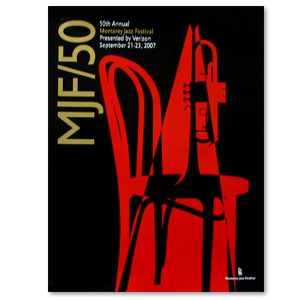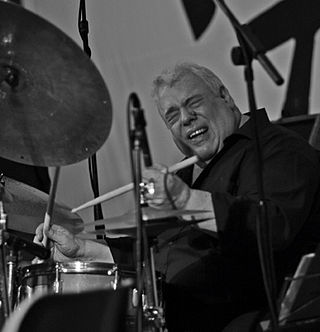Related Research Articles

Sonny Stitt was an American jazz saxophonist of the bebop/hard bop idiom. Known for his warm tone, he was one of the best-documented saxophonists of his generation, recording more than 100 albums. He was nicknamed the "Lone Wolf" by jazz critic Dan Morgenstern because of his tendency to rarely work with the same musicians for long despite his relentless touring and devotion to the craft. Stitt was sometimes viewed as a Charlie Parker mimic, especially earlier in his career, but gradually came to develop his own sound and style, particularly when performing on tenor saxophone and even occasionally baritone saxophone.

The Monterey Jazz Festival is an annual music festival that takes place in Monterey, California, United States. It debuted on October 3, 1958, championed by Dave Brubeck and co-founded by jazz and popular music critic Ralph J. Gleason and jazz disc jockey Jimmy Lyons.

Robert Sage Wilber was an American jazz clarinetist, saxophonist, and band leader. Although his scope covers a wide range of jazz, Wilber was a dedicated advocate of classic styles, working throughout his career to present traditional jazz pieces in a contemporary manner. He played with many distinguished jazz leaders in the 1950s and 1960s, including Bobby Hackett, Benny Goodman, Sidney Bechet, Jack Teagarden and Eddie Condon. In the late 1960s, he was an original member of the World's Greatest Jazz Band, and in the early 70s of Soprano Summit, a band which gained wide attention. In the late 1970s, he formed the Bechet Legacy Band.

Ronnie Scott's Jazz Club is a jazz club that has operated in Soho, London, since 1959.

Scott Hamilton is an American jazz tenor saxophonist associated with swing and straight-ahead jazz. His eldest son, Shō Īmura, is the vocalist of the Japanese rock band Okamoto's.

George Duvivier was an American jazz double-bassist.
James Elbert Raney was an American jazz guitarist, born in Louisville, Kentucky, United States, known for his work from 1951 to 1952 and then from 1953 to 1954 with the Red Norvo trio and, during the same time period, with Stan Getz. In 1954 and 1955, he won the DownBeat Critics' Poll for guitar. Raney worked in a variety of jazz mediums, including cool jazz, bebop, post bop, hard bop, and mainstream jazz.

Martin Drew was an English jazz drummer who played with Ronnie Scott between 1975 and 1995 and with Oscar Peterson between 1974 and 2007.
John Cocuzzi is an American jazz, blues, and swing musician who specializes in the vibraphone and piano, as well as drums. His primary influences on vibraphone are Lionel Hampton and Red Norvo, while his piano playing is influenced by piano greats from both the jazz and blues worlds.
Martin Oliver Grosz is an American jazz guitarist, banjoist, vocalist, and composer born in Berlin, Germany, the son of artist George Grosz. He performed with Bob Wilber and wrote arrangements for him. He has also worked with Kenny Davern, Dick Sudhalter, and Keith Ingham.
"In a Mellow Tone", also known as "In a Mellotone", is a 1939 jazz standard composed by Duke Ellington, with lyrics written by Milt Gabler. The song was based on the 1917 standard "Rose Room" by Art Hickman and Harry Williams, which Ellington himself had recorded in 1932. Howard Stern used a recording of this song as the opening theme to The Howard Stern Show from 1987 to 1994.

Charles J. Thornton, Jr., known professionally as Butch Miles, was an American jazz drummer. He played with the Count Basie Orchestra, Dave Brubeck, Ella Fitzgerald, Sammy Davis Jr., Frank Sinatra, Lena Horne, and Tony Bennett.

Elmer "Mousey" Alexander was an American jazz drummer.
Black & Blue Records was a record company and label founded in France in 1968 that specialized in blues and jazz.
Sackville Records was a Canadian record company and label that specialized in jazz. In 2011, with Sackville defunct, Delmark Records acquired its catalogue.
Wendell Marshall was an American jazz double-bassist.
The World's Greatest Jazz Band was an all-star jazz ensemble active from 1968 to 1978.
Chiaroscuro Records is a jazz record company and label founded by Hank O'Neal in 1970. The label's name comes from the art term for the use of light and dark in a painting. O'Neal came up with the name via his friend and mentor Eddie Condon, a jazz musician who performed in what were called Chiaroscuro Concerts in the 1930s. O'Neal also got the name from a store that sold only black and white dresses.
Chris Flory is an American jazz guitarist.
The George H. Buck Jr. Jazz Foundation was created by George Buck in the 1980s to maintain the catalog of his jazz record labels. The catalog includes dixieland jazz, swing, blues, rhythm and blues, gospel, and cabaret music.
References
- ↑ "Progressive Records Catalog". www.jazzology.com.
- ↑ Davis, John S. (2012). Historical Dictionary of Jazz. Lanham, MD: Scarecrow Press. p. 296.
- 1 2 "Gus Statiras: 1923-2004". www.jazzhouse.org.
- 1 2 Gardner, Mark (2002). Kernfeld, Barry (ed.). The New Grove Dictionary of Jazz. Vol. 3 (2nd ed.). New York: Grove's Dictionaries. p. 331. ISBN 1-56159-284-6.
- 1 2 "Various US labels (2) - jazz album covers". www.birkajazz.com.
- ↑ Yanow, Scott (1998). "Labels". In Erlewine, Michael; Bogdanov, Vladimir; Woodstra, Chris; Yanow, Scott (eds.). All Music Guide to Jazz (3rd ed.). San Francisco: Miller Freeman Books. ISBN 0-87930-530-4.